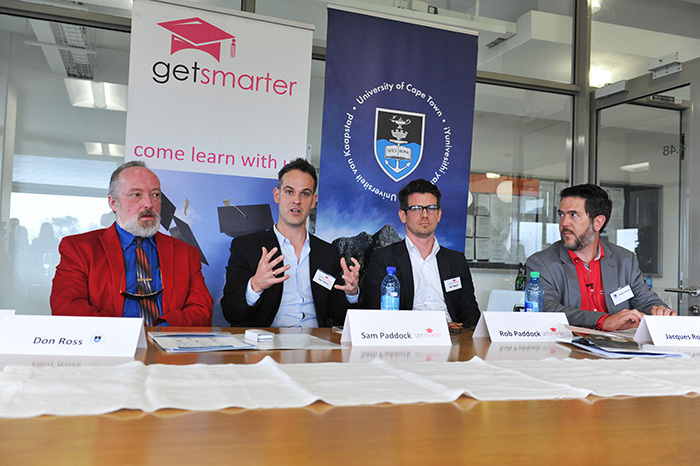UCT's online learning course shows surprising benefits for students
29 August 2014 | Story by Newsroom
UCT has launched the first two of a planned suite of online postgraduate programmes as part of a strategic initiative that will enable students across Africa to study with high-touch interactive support '“ anytime, anywhere. Managing director of UCT's new Across Africa educational initiative, Jacques Rousseau, explains the benefits.
Is technology an enabler of broadening access to education, or is it an impediment? This was the challenge that led the Commerce Faculty at UCT to experiment with a blend of online and face-to-face education models.
The results were surprising: students from disadvantaged backgrounds sometimes performed better through online learning, as they could study when they wanted to and how they wanted to.
This revelation has led to a suite of online courses, launched this week by UCT. The university launched Across Africa, an initiative that will allow students from across Africa to earn UCT qualifications via blended-learning (a combination of face-to-face and online instruction) mode.
Across Africa is a partnership with GetSmarter, who have developed an interactive virtual learning environment (VLE) that, when paired with UCT's content and quality assurance, holds the promise of the highest quality online education.
Scepticism about online learning is widespread, thanks to the proliferation of Moocs (Massive Open Online Courses) in recent years. Moocs have low completion rates, with students tending to drop out after a few weeks.
Furthermore, Moocs are seldom recognised for university credit and not consistently acknowledged in the workplace, making it difficult for students to sustain their motivation for taking these courses.
However, comparisons between Moocs and Across Africa's qualifications are inappropriate, except for the fact that the medium of instruction is similar. We are offering credit-bearing UCT qualifications, fully equivalent to their conventional versions.
Second, GetSmarter's high-touch support model '“ involving real-time support from instructors, engagement with analytics regarding student interaction in order to pre-emptively provide support, and lively interaction with a virtual community of students '“ has resulted in completion rates above 90 percent in the short courses UCT has been offering with GetSmarter for a number of years.
When we began planning Across Africa in 2011, I volunteered to convert my firstyear course, Evidence-based Management, into blended-learning mode as a pilot project, for us to determine how well this mode could meet the needs of residential UCT students. Alongside that, the capstone Business Science course, Strategic Thinking, was also piloted in blended mode.
Both Dale Williams, the convenor of Strategic Thinking, and I were delighted with the results of the pilots. Student engagement was far in excess of anticipations, while course evaluations '“ and crucially, results '“ indicated that students were enjoying, and also benefiting from, the new mode of delivery.
During the first semester of 2013, I was responding to an average of 80 discussions a week in the course forums. This was not because of student confusion, but rather because the online mode is arguably a far more natural environment for a student in the 21st century than sharing a room with 400 other students.
My course is taught to 1 000 students in the first semester, which traditionally meant repeating the same lecture, three times in a row, to groups of 300 or more students. In that environment, it's difficult for a student to ask a question, never mind for me to hear the question over the background noise.
But online, when you've had the chance to read the course material and watch the lectures in your own time, it's easy to ask the question that you want to ask '“ and to find students who are interested in discussing the same issue. I'd often find them solving their own problems, only needing to log in to post congratulations for their having done so.
Blended-learning entails a combination of online and face-to-face teaching, and both Dale and I offered "live" lectures and tutorials to supplement the online material, and of course to help with the student transition to virtual learning.
To my surprise, though, towards the end of the semester these sessions ended up consisting of discussion and debate only tangentially related to the course material '“ students were getting all they needed (in terms of examinable content) online.
The thing many of us were worried about, particularly in the first-year course, was the so-called "digital divide" and what impact a shift to blended mode might have on students who were less technologically adept. The face-to-face sessions were intended to cover for this, and we also ran a week of tutorials dealing simply with the technology of the VLE.
However, our concerns ended up being unfounded. Students from disadvantaged backgrounds performed equally well '“ in some programmes, better '“ than they had in previous years.
Part of the reason for this might be that our concerns regarding the digital divide were exaggerated, but for me the answer lies in the fact that when you can work on your own schedule, as blended-learning allows, it's possible to watch, and re-watch, a lecture as often as you like, making notes and asking questions on your own schedule. In a class of 300, there's no time to reflect, and you're often simply trying to keep up.
Of course, not all courses, and not all students, will be as good a fit to the blended-learning model. We're not planning to turn our classrooms into boardrooms, or to offer a blended-learning version of all of our courses. But where the fit works, it can work very well.
We believe that blended-learning has the potential to exponentially increase access to education, and that offering these qualifications is another way that UCT can contribute to alleviating developmental challenges on the continent.
So in 2015, if you hear talk of our Postgraduate Diploma in Management in Marketing or the Advanced Diploma in Business Project Management, that's a sense of the context from which these courses originate, and of the value we place in Across Africa as a resource in, and for the future.
Story by Jacques Rousseau. Originally published in the Cape Times, 22 August 2014. Image by Michael Hammond.
 This work is licensed under a Creative Commons Attribution-NoDerivatives 4.0 International License.
This work is licensed under a Creative Commons Attribution-NoDerivatives 4.0 International License.
Please view the republishing articles page for more information.










